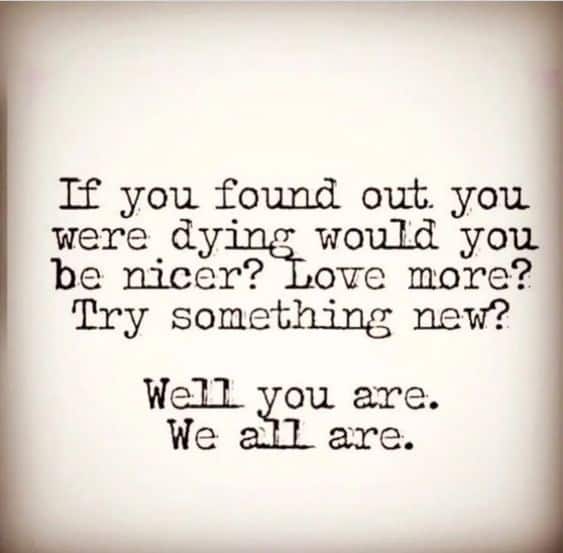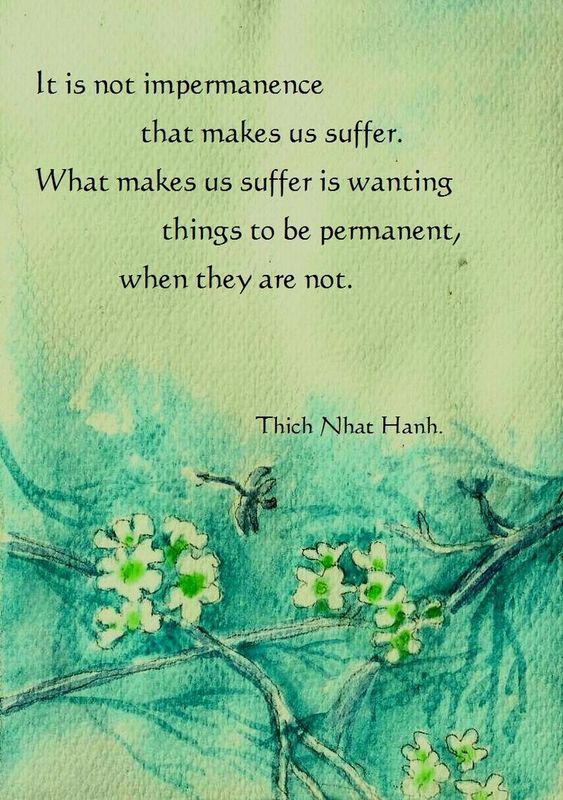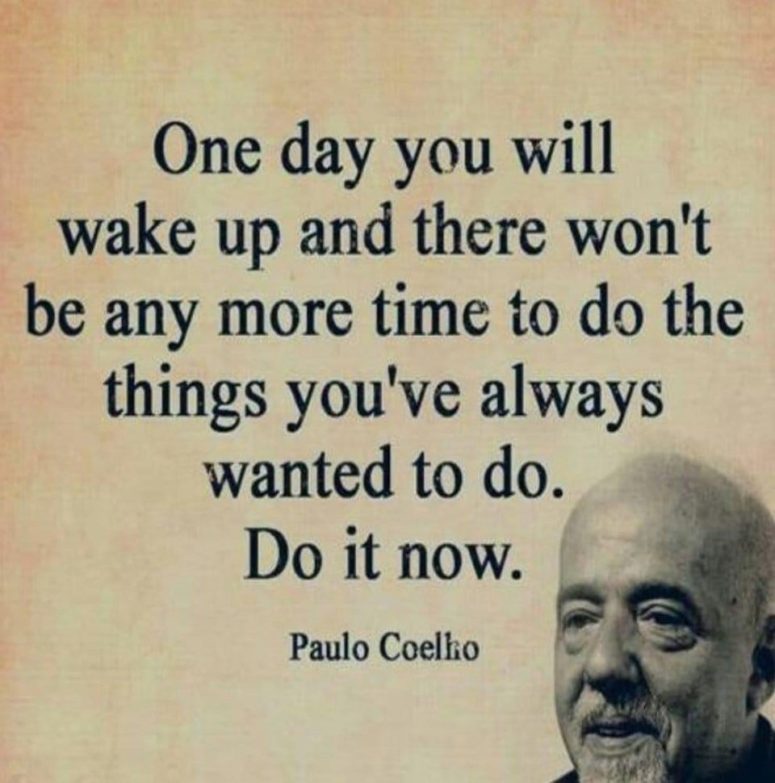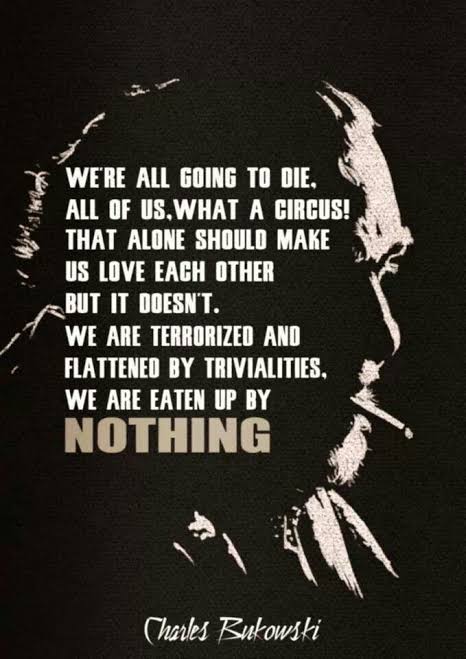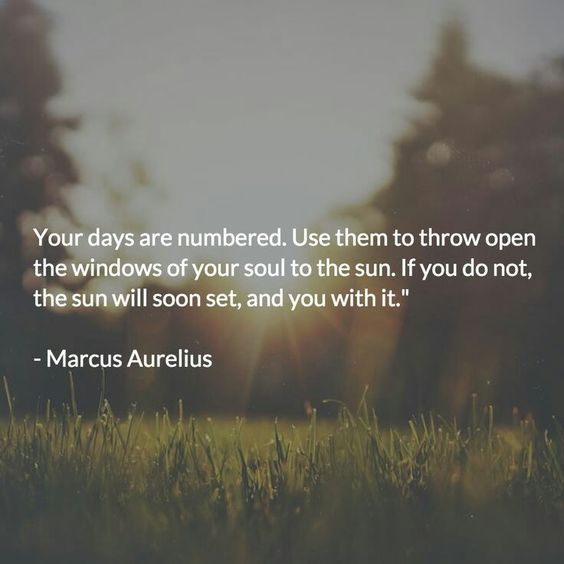“Life is the constant approach to death; therefore, life can be bliss only when death does not seem to be an evil.”
Leo Tolstoy, A Calendar of Wisdom (Page 145)
“We have an irrational fear of acknowledging our own mortality. We avoid thinking about it because we think it will be depressing. In fact, reflecting on mortality often has the opposite effect—invigorating us more than saddening us. Why? Because it gives us clarity.”
Ryan Holiday, The Daily Stoic (Page 361)
“Let us prepare our minds as if we’d come to the very end of life. Let us postpone nothing. Let us balance life’s books each day… The one who puts the finishing touches on their life each day is never short of time.”
Seneca, Moral Letters, via The Daily Stoic (Page 349)
“The core of life is about losses and deaths both subtle and catastrophic, over and over again, and also about loving and rising again. The cancer, the car accident—these are extreme experiences of other trajectories we’re on—aging, the loss of love, the death of dreams, the child leaving home. Grief and gladness, sickness and health, are not separate passages. They’re entwined and grow from and through each other, planting us, if we’ll let them, more profoundly in our bodies in all their flaws and their grace.”
Krista Tippett, Becoming Wise (Page 68)
“Anything that is given can be at once taken away. We have to learn never to expect anything, and when it comes it’s no more than a gift on loan.”
John McGahern, The Leavetaking, via Sunbeams (Page 109)
“Every day matters. The awareness of our mortality can help us pursue a goal. We all have a limited amount of time on earth. Those who live in active awareness of this reality are more likely to identify goals and make progress toward them. Or to put it another way: Everyone dies, but not everyone truly lives.”
Chris Guillebeau, The Happiness of Pursuit (Page 268)
“All of us will someday die. Yet not all of us live in a state of active awareness of this reality. In the words of a great Bob Dylan song, ‘He not busy being born is busy dying,’ and perhaps some of us are busier than others.”
Chris Guillebeau, The Happiness of Pursuit (Page 58)
“Every day matters. The emotional awareness of mortality can help us pursue a goal.”
Chris Guillebeau, The Happiness of Pursuit (Page 54)
“Were you to live three thousand years, or even a countless multiple of that, keep in mind that no one ever loses a life other than the one they are living, and no one ever lives a life other than the one they are losing. The longest and the shortest life, then, amount to the same, for the present moment lasts the same for all and is all anyone possesses. No one can lose either the past or the future, for how can someone be deprived of what’s not theirs?”
Marcus Aurelius, Meditations, via The Daily Stoic (Page 85)
“In India it is common wisdom that the world is like a waiting room in a railway station; it is not your house. You are not going to remain in the waiting room forever. Nothing in the waiting room belongs to you—the furniture, the paintings on the wall… You use them—you see the painting, you sit on the chair, you rest on the bed—but nothing belongs to you. You are just here for a few minutes, or for a few hours at the most, then you will be gone.”
Osho, Courage (Page 34)
“Your body is just a loan from this planet. What you call ‘death’ is just Mother Earth reclaiming the loan that she offered to you. All life on this planet is just a recycle of the earth. You may think right now that you are going to your office, home, or football match, but as far as your body is concerned, it is going, moment by moment, straight toward the grave. Right now, you may have forgotten, but slowly, as time passes, it will become more apparent that this is the nature of the body.”
Sadhguru, Inner Engineering (Page 150)
“You are living as if destined to live for ever; your own frailty never occurs to you; you don’t notice how much time has already passed, but squander it as though you had a full and overflowing supply—though all the while that very day… may be your last.” ~ Seneca, via Essential Zen Habits (Page 22)
“It is not impermanence that makes us suffer. What makes us suffer is wanting things to be permanent, when they are not.”
Thich Nhat Hanh | Read Matt’s Blog on this Quote ➜
“Understanding the meaning of impermanence makes us less desperate people. It gives us dignity. We no longer grasp at pleasure, trying to squeeze out every last drop. We no longer consider pain something we should fear, deny, and avoid. We know that it will change.” ~ Sakyong Mipham, Turning the Mind Into An Ally (Page 150)
“Contemplating impermanence can be a liberating experience, one that brings both sobriety and joy. In essence, we become less attached. We realize we can’t really have anything. We have money and then it’s gone; we have sadness and then it’s gone. No matter how we want to cling to our loved ones, by nature every relationship is a meeting and parting. This doesn’t mean we have less love. It means we have less fixation, less pain. It means we have more freedom and appreciation, because we can relax into the ebb and flow of life.” ~ Sakyong Mipham, Turning the Mind Into An Ally (Page 150)
